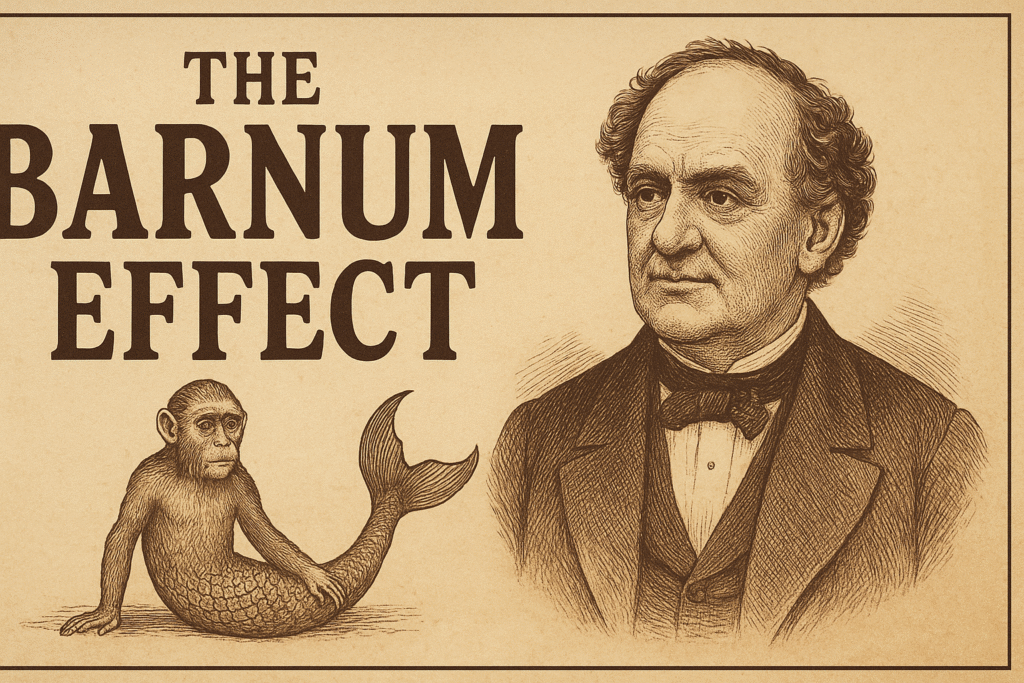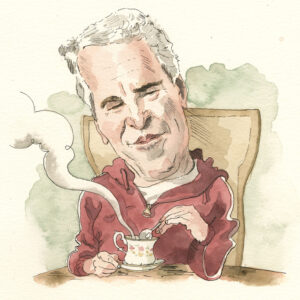
Have you ever read your horoscope and marvelled at how spot-on it seemed? Perhaps a personality test declared, “You have a great need for others to admire you—though sometimes you’re critical of yourself.”
You nodded, feeling seen—until learning everyone else got the same result. Welcome to the Barnum effect, our mind’s knack for believing that broad, generic statements are uniquely written for us.
Who Was PT Barnum, and Why Does His Shadow Still Linger?
Imagine nineteenth-century America—a cacophonous carnival of cobblestones, carriages and charlatans. Into this febrile mêlée strides Phineas Taylor Barnum, impresario extraordinaire, connoisseur of humbug, and maestro of monetised mendacity.
Barnum’s genius lay not in fabricating marvels, but in transmogrifying mediocrity into magnificence. His infamous Feejee Mermaid—a grotesque taxidermic chimera of monkey torso and fish tail—was less zoological discovery than zoological desecration. Yet thousands queued, coins in hand, to marvel.
And then there was Jumbo the Elephant, whose prodigious proportions so transfixed the public imagination that his very name lumbered permanently into our lexicon. When Jumbo met his end beneath a railway engine, Barnum, undeterred, exhibited the skeleton and hide separately, thereby creating a profitable pachydermal sequel. Truly, he was capitalism incarnate.
“There’s a sucker born every minute.”
What Is the Barnum Effect, and Why Do We All Fall for It?
Consider the blandishments of a horoscope: “You often doubt yourself, yet harbour untapped potential.” Cue the inward swoon. But pause! This alleged uniqueness applies with equal felicity to your milkman, your mother-in-law, and your postman with the suspicious moustache.
This is the Barnum effect—our willingness to accept ambiguous banalities as bespoke truths. It is the lifeblood of astrologers, the raison d’être of fortune cookies, and the raison-de-click of those infernal quizzes that inform you you’re “75 per cent Elizabeth Bennet, 25 per cent Lady Macbeth.”
Is our treasured individuality but a mirage—a parlour trick wrapped in flattery? Suspense thickens like Victorian fog.
How Did a Psychologist Prove It—With the Panache of a Magician?
Enter Bertram Forer, psychologist-cum-prankster, who in 1948 executed an experiment of such elegant duplicity that Barnum himself might have applauded. Forer handed students “individualised personality assessments,” all of which were in fact identically generic.
Phrases such as “You have a great need for other people to like and admire you” elicited solemn nods of self-recognition. The students rated the profiles astonishingly accurate. Then Forer revealed the ruse. One imagines the collective mortification was only exceeded by Barnum’s celestial guffaws.
“The noblest art is that of making others happy.”
Why Do Horoscopes, Fortune Cookies, and Quizzes Feel Uncannily Accurate?
Because, dear interlocutor, they are engineered with Machiavellian precision. The Barnum statement is a linguistic Swiss Army knife:
– Vagueness: “At times, you feel uncertain.”
– Flattery: “But you are stronger than you realise.”
– Duality: “You enjoy people, though sometimes solitude.”
Voilà—every reader departs feeling uniquely understood. Barnum’s American Museum deployed the same sorcery. Its menagerie of hoaxes and oddities convinced patrons they were peering into secrets unavailable to the hoi polloi. In truth, they were purchasing the illusion of exclusivity—the same illusion your horoscope peddles for the price of your morning newspaper.
What Tricks of the Mind Keep Us Hooked?
The Barnum effect is abetted by three cognitive culprits:
1. Confirmation bias—our psychological proclivity for cherry-picking agreeable evidence.
2. Selective perception—our talent for spotlighting flattery while airbrushing critique.
3. Existential narcissism—our quixotic yearning to be special, to be the singular snowflake in a blizzard of humanity.
Together they form a cognitive chorus, applauding even the most vapid banalities. Barnum understood instinctively that mankind’s greatest weakness was not ignorance but its inexhaustible appetite for reassurance.
“The art of money-making is perhaps the most important of all the arts.”
Who Exploits the Barnum Effect—and Why Should We Worry?
Here, the tale acquires sinister chiaroscuro. Astrologers and clairvoyants, with oracular solemnity and suspiciously expensive crystals, ply the Barnum effect daily. Faith healers proffer “universal remedies” with universal uselessness. And corporate consultants lace boardrooms with sesquipedalian twaddle—“synergising core competencies” and “leveraging dynamic paradigms”—phrases so nebulous they could apply equally to a bakery or a space programme.
The danger, alas, is not in amusement. A fortune cookie may entertain; a fraudulent healer may endanger. When vague reassurances cost lives, Barnum’s legerdemain curdles into malevolence.
Can We Outsmart This Circus Trick, or Are We Doomed?
Resistance is possible, though it requires vigilance. The next time someone lauds your “complex interplay of introversion and extroversion,” pause before genuflecting. Ask: Could this also describe my neighbour, my grandmother, or the chap who persistently forgets to mute himself on Zoom?
Barnum’s fingerprints are unmistakable: phrases beginning with “sometimes” or “at times,” anodyne dualities, and an aura of benevolence designed to flatter. Recognise these, and you step out of the circus tent, ticket refunded.
Why, Despite Ourselves, Do We Find It All So Delightful?
Because the Barnum effect, while it exposes our gullibility, also massages our vanity. It assures us that someone—be it astrologer, psychologist, or Buzzfeed intern—“sees” us.
Barnum’s real genius lay in creating collusion: the public did not merely fall for his tricks, they chose to. To attend his show was to participate in a communal suspension of disbelief, a conspiratorial wink at reality.
“The public is very gullible.”
Curtain Call: What Would Barnum Say to Us Today?
Were Barnum to resurrect himself (and promptly monetise the miracle by charging admission), he would gaze at our horoscopes, our Myers-Briggs typologies, our endless self-discovery quizzes, and declare:
“Ladies and gentlemen, the circus is eternal—and it is you.”
For the Barnum effect is not a relic of psychology’s annals. It is the ongoing drama of human credulity, a performance staged daily in our newspapers, offices, and social media feeds. The stage is our mind; the applause, our own gullibility.



